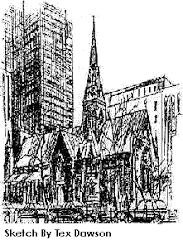Harts drinking from the living water that flows from the foot of the cross, but above them lurks a serpent threatening even those who have come so close to the source of life. Basilica di S. Clemente, Rome. 12th cent. Cf. Psalm 42(LXX 41): 1: As the hart panteth after the water brooks, so panteth my soul after thee, O God.
Giovanni Pierluigi da Palestrina: Sicut Cervus
Sicut cervus desiderat ad fontes aquarum, ita
desiderat anima mea ad te, Deus.
As the hart desires the water brooks, so longs my
heart after thee: my soul longs after thee, O God.
Sitivit anima mea ad Deum fontem vivum:
quando veniam et apparebo ante faciem Dei?
My whole soul thirsts for the living God: when
shall I come, and appear before the face of God?
Fuerunt mihi lacrymae meae panes die ac
nocte, dum dicitur mihi quotidie: Ubi est
Deus tuus?
I have known no other food than tears, day and
night; daily must I listen to the taunt: ‘Where is
now thy God?
Psalm 42. 1–3
The final liturgical act of Holy Saturday
is what we now know as the Easter Vigil.
This service of renewal forms the final
preparation for Easter itself, and its tone
shows a subtle but significant change from
that of Tenebrae. The changed mode of the
liturgy is perfectly reflected in Palestrina’s
simply affecting motet Sicut cervus. Sung
during the blessing of the baptismal water,
the liquid images of this psalm text bear
obvious significance. Far from the probing
tensions which underpin the Lamentations,
the opening melodies of Sicut cervus return
us to the composer’s more familiar, balanced
style. Even the final line of the text, ‘Ubi est
Deus tuus?’ (Where is now thy God?) draws
little in the way of dissonance from the
composer: to Palestrina, particularly with
Easter Sunday on the horizon, this was
evidently a rhetorical question. In every
sense, by this stage little appears left to be
resolved.
© 2002 Simon Ravens
To be sure the text remains available to follow, right-click on [listen], then left-click on "Open in New Window."
Coro della Radio Svizzera, Diego Fasolis conducting [listen]
Voices of Ascension, Donald Keene conducting [listen]
Amici Cantores [listen]Galata Chamber Choir [listen]
Poznan Nightingales, Stefan Stuligrosz conducting [YouTube]
Westminster Cathedral Choir, James O'Donnell conducting [YouTube]
Maîtrise des Hauts-de-Seine, Gaël De Kerret conducting [CML]
Choir of Christ Church Cathedral, Oxford, Stephen Darlington conducting. [CML]
Cambridge Singers, John Rutter conducting [NML]
Regensburg Cathedral Choir, Georg Ratzinger, conducting [NML] Musica Contexta, Simon Ravens, conducting [NML]
Christ Church Anglican Cathedral is located in the heart of downtown Montreal, Quebec, at the corner of rue University and rue Ste-Catherine Ouest.
Click to go immediately to:
1) The Music Programme Homepage
2) The Music Calendar for Choral Eucharist and Evensong
3) An ABC of Composers and Musicians
4) The Current Choir Notes
For an explanation of [BNQ; BM], [CML] and where they lead Click here.)
If the text is available, to follow it while listening to the music, always right-click, then left-click on "open in new window," then arrange windows.
1) The Music Programme Homepage
2) The Music Calendar for Choral Eucharist and Evensong
3) An ABC of Composers and Musicians
4) The Current Choir Notes
For an explanation of [BNQ; BM], [CML] and where they lead Click here.)
If the text is available, to follow it while listening to the music, always right-click, then left-click on "open in new window," then arrange windows.
